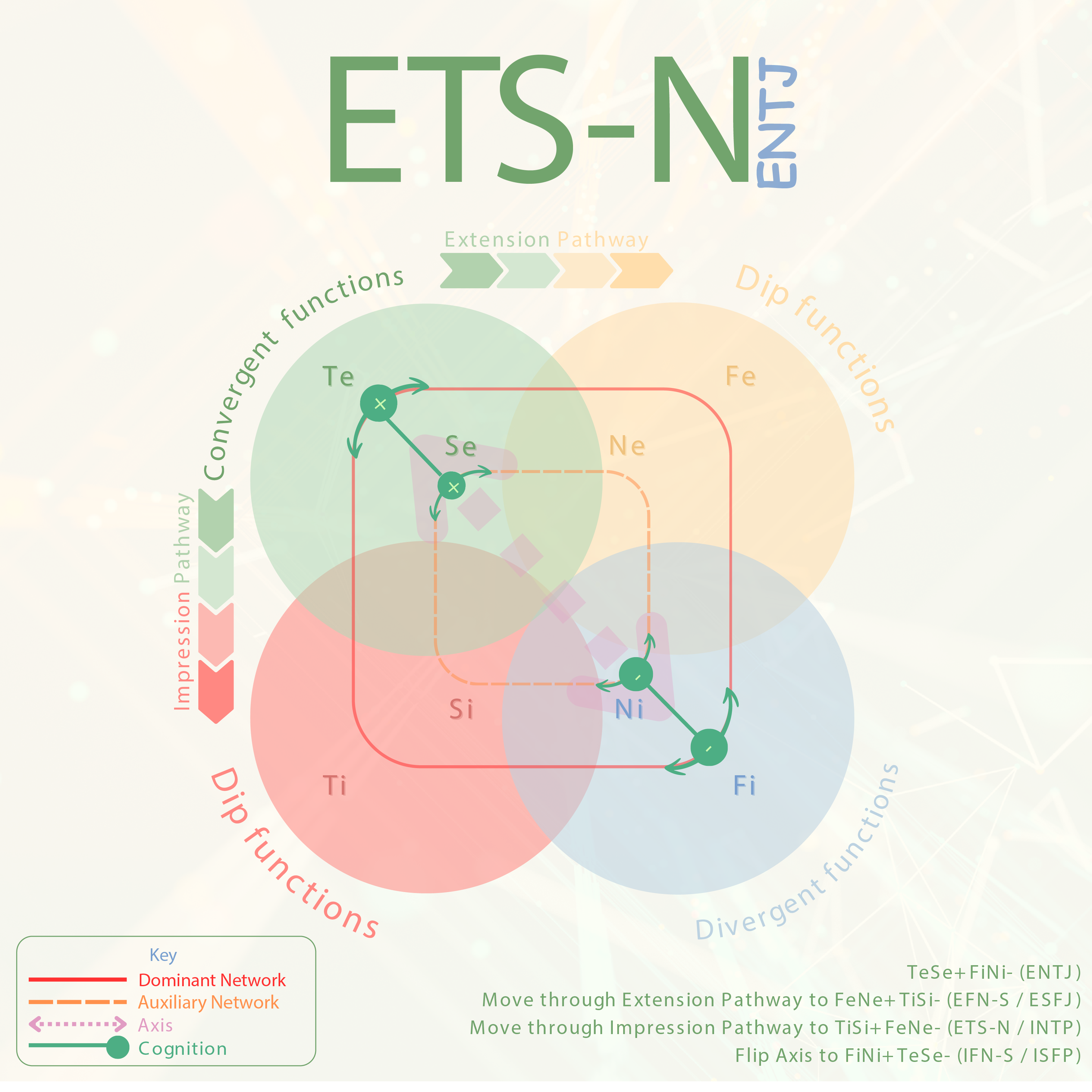
The ENTJ, also known as eTS in Cognitive Personality Theory (CPT), is a dynamic and driven type characterised by their dominant Extraverted Thinking (Te), agency Extraverted Sensing (Se), authority Introverted Intuition (Ni), and oppositional Introverted Feeling (Fi). This combination of positions for the underlying cognitive elements makes for someone who realises potential within the context they are exposed to, driven by a desire or ideal of something grand and beautiful they wish to attain and realise in concrete external reality.
Dominant Position: Extraverted Thinking (Te)
As the dominant function, Extraverted Thinking (Te) provides the ENTJ with a focus on external variables and practical implementation. This function excels at organising, planning, and executing tasks to achieve their goals efficiently and effectively.
How it Feels: For the ENTJ, Te dominance means being constantly aware of the external landscape and how it can be leveraged to achieve their objectives. They are always on the lookout for useful resources and strategies to maximise their impact, making them oftentimes highly goal-oriented and strategic in their approach to life. The modern climate can biase the perception of Te dominance towards the organisational setting when it in reality can extend much to the creative as it can the coorporate (and oftentimes both!).
Agency Position: Extraverted Sensing (Se)
In the agency position, Extraverted Sensing (Se) provides the ENTJ with the raw intensity and presence of character to make a significant impact. Se is fast-switching and enables them to take decisive action, ensuring they are always ready to seize opportunities and make a splash.
How it Feels: With Se as their agency function, ENTJs can effectively engage with their environment, taking bold and immediate action. They invest their ego in their ability to influence and control their surroundings, making them dynamic and assertive in their pursuits.
Authority Position: Introverted Intuition (Ni)
Introverted Intuition (Ni) in the authority position acts as a guiding vision for the ENTJ, ensuring they remain accountable to their long-term goals. Ni provides a sense of direction and purpose, helping them to stay focused on their ultimate objectives.
How it Feels: Ni in this position can feel like an internal compass, constantly pointing the ENTJ towards their grand vision. This function helps them maintain a clear sense of purpose and ensures that their actions are aligned with their long-term goals, even if it means making difficult decisions along the way.
Oppositional Position: Introverted Feeling (Fi)
In the oppositional position, Introverted Feeling (Fi) serves as a delicate yet essential function. Fi provides the ENTJ with a sense of authenticity and personal integrity, ensuring their actions are aligned with their inner values. However, it can also be a source of tension as it generates desires and potentials that must be realised, but not always questioned.
How it Feels: Fi in the oppositional position often feels like a subtle, yet powerful undercurrent driving the ENTJ’s actions. While it can be a source of internal conflict due to its sensitivity, it also provides valuable insights into their true desires and motivations. This function encourages them to stay true to themselves, even as they pursue their ambitious goals.
Cognitive Dynamics and Dip Functions
The ENTJ’s cognitive dynamics are characterised by their ability to leverage external variables and take decisive action through Te-Se. This type excels at realising potential within their environment, ensuring their goals are achieved efficiently and effectively.
Dips:
TeSe - FeNe: Engaging charismatic skillsets to forge meaningful bonds with comrades on life's path. This dip allows the ENTJ to use their dynamic presence and charm to build strong relationships and alliances.
TeSe - TiSi: Baking important variables into rehearsable knowledge banks to ensure efficiency across situations. This dip helps the ENTJ develop a robust understanding of the key factors that drive success, allowing them to navigate different contexts with ease.
FiNi - TiSi: Understanding the variables that drive the self; the self as a system. This dip helps the ENTJ gain a deeper understanding of their internal motivations and how they align with their broader goals.
Conclusion
The ENTJ (eTS) is one of the most naturally wilful types, often able to draw upon immense reserves of energy and determination to see their goals to the finish line. Their dominant Extraverted Thinking (Te) drives them to leverage external variables and take strategic action, while their agency Extraverted Sensing (Se) ensures they make a significant impact. The authority Introverted Intuition (Ni) provides a guiding vision, and the oppositional Introverted Feeling (Fi) ensures they remain true to their innermost desires. Together, these functions create a personality that excels at realising potential and achieving ambitious goals, making them highly effective and dynamic leaders.
Illustrations by Rivka B.